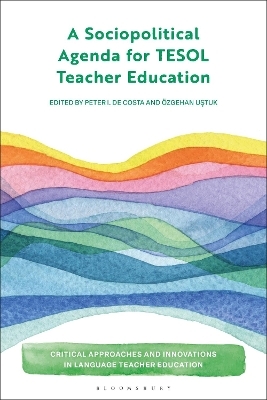
A Sociopolitical Agenda for TESOL Teacher Education
Bloomsbury Academic (Verlag)
978-1-350-26284-3 (ISBN)
(often uncritically) for classroom application and practice, with the intention of training teachers to become technicians in their respective classrooms. In reality, TESOL practitioners often find themselves
in situations that require them to be reflexive practitioners and to negotiate sites of political struggles and social injustice.
Given that a socially situated understanding of TESOL teacher education is often overlooked, this volume highlights the sociopolitical dimensions of TESOL teacher education. In Part 1, the authors introduce the theoretical underpinnings of the sociopolitical agenda proposed by this volume. Building on these theories, Part 2 realizes the proposed agenda by situating it within actual TESOL teacher education contexts that are characterized by power imbalances and neoliberally inflected educational injustices.
Peter I. De Costa is Associate Professor of Linguistics and Education at Michigan State University, USA. Özgehan Ustuk is a Postdoctoral Fellow at the Hong Kong Polytechnic University, Hong Kong.
List of Figures
List of Tables
List of Contributors
Series Editor Foreword
Foreword: On Developing Fluency in Humaning, Maggie Kubanyiova (Leeds University, UK)
1. Introduction: A Sociopolitical Agenda for TESOL Teacher Education and Why It Matters, Peter I. De Costa (Michigan State University, USA) and Özgehan Ustuk (Balikesir University, Turkey)
Part I: Theoretical Underpinnings of the Sociopolitical Agenda
2. The Imperative of Language Teacher Leadership in an Unjust World, Dudley Reynolds (Carnegie Mellon University, Qatar)
3. Pedagogical and Conceptual Principles of Teacher Professional Learning in TESOL: Teacher Stories from Turkey, Kenan Dikilitas (University of Stavanger, Norway) and Irem Çomoglu (Dokuz Eylul University, Turkey)
4. (Non)Native Speakerism in English Language Teaching: Changing Perspectives, Resilient Discourses, and Missing Links, Ali Fuad Selvi (University of Alabama, USA)
5. Critical engagement with achievement gap discourses and data: Narrowing or not?, Jamie L. Schissel (University of North Carolina at Greensboro, USA) and Nancy H. Hornberger (University of Pennsylvania, USA)
Part II: Setting the Sociopolitical Agenda
6. “Figuring out my end game”: Supporting Novice ESOL Teachers’ Emerging Identities as Humanizing Practitioners and Advocates through Peer Interaction, Megan Madigan Peercy (University of Maryland College Park, USA), Danielle Gervais Sodani (University of Maryland College Park, USA) and Wyatt Hall (Georgia Gwinnett College, USA)
7. Implementing an Intersectional Pedagogy in a TESOL Methods Course: A Narrative Approach, Hayriye Kayi-Aydar (University of Arizona, USA)
8. Teacher Identity in Critical Autoethnographic Narrative: Making Sense of The Political In The Personal, Bedrettin Yazan (University of Texas at San Antonio, USA)
9. Developing Decolonizing Language Teachers in Colonial Sociopolitical Contexts, Mario E. López-Gopar, Vilma Huerta Cordova, William M. Sughrua, Juan Ignacio Martínez Martínez and Denisse Zárate Ríos (Universidad Autónoma Benito Juárez de Oaxaca, Mexico)
Afterword: Interrogating and Destabilizing the Canon of TESOL Teacher Education, Peter Sayer (Ohio State University, USA)
Index
| Erscheinungsdatum | 21.10.2023 |
|---|---|
| Reihe/Serie | Critical Approaches and Innovations in Language Teacher Education |
| Zusatzinfo | 10 bw illus |
| Verlagsort | London |
| Sprache | englisch |
| Maße | 156 x 234 mm |
| Themenwelt | Schulbuch / Wörterbuch ► Wörterbuch / Fremdsprachen |
| Geisteswissenschaften ► Sprach- / Literaturwissenschaft ► Sprachwissenschaft | |
| Sozialwissenschaften ► Pädagogik | |
| ISBN-10 | 1-350-26284-6 / 1350262846 |
| ISBN-13 | 978-1-350-26284-3 / 9781350262843 |
| Zustand | Neuware |
| Haben Sie eine Frage zum Produkt? |
aus dem Bereich


